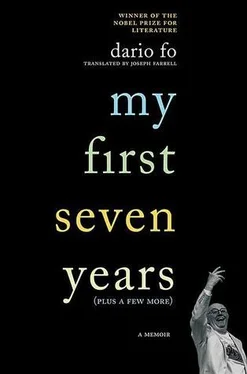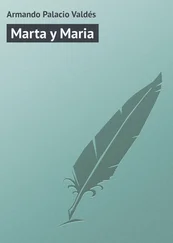Dario Fo - My First Seven Years (Plus a Few More)
Здесь есть возможность читать онлайн «Dario Fo - My First Seven Years (Plus a Few More)» весь текст электронной книги совершенно бесплатно (целиком полную версию без сокращений). В некоторых случаях можно слушать аудио, скачать через торрент в формате fb2 и присутствует краткое содержание. Год выпуска: 0101, Издательство: St. Martin's Press, Жанр: Биографии и Мемуары, на английском языке. Описание произведения, (предисловие) а так же отзывы посетителей доступны на портале библиотеки ЛибКат.
- Название:My First Seven Years (Plus a Few More)
- Автор:
- Издательство:St. Martin's Press
- Жанр:
- Год:0101
- ISBN:нет данных
- Рейтинг книги:3 / 5. Голосов: 1
-
Избранное:Добавить в избранное
- Отзывы:
-
Ваша оценка:
- 60
- 1
- 2
- 3
- 4
- 5
My First Seven Years (Plus a Few More): краткое содержание, описание и аннотация
Предлагаем к чтению аннотацию, описание, краткое содержание или предисловие (зависит от того, что написал сам автор книги «My First Seven Years (Plus a Few More)»). Если вы не нашли необходимую информацию о книге — напишите в комментариях, мы постараемся отыскать её.
My First Seven Years In a series of colorful vignettes, Fo draws us into a remarkable early life filled with characters and anecdotes that would become the inspiration for his own creative genius.
My First Seven Years (Plus a Few More) — читать онлайн бесплатно полную книгу (весь текст) целиком
Ниже представлен текст книги, разбитый по страницам. Система сохранения места последней прочитанной страницы, позволяет с удобством читать онлайн бесплатно книгу «My First Seven Years (Plus a Few More)», без необходимости каждый раз заново искать на чём Вы остановились. Поставьте закладку, и сможете в любой момент перейти на страницу, на которой закончили чтение.
Интервал:
Закладка:
Everything is ready.
But having several times altered the sequence of his paintings, the Master can no longer remember which is the original, particularly since, in the confusion, he has painted over it as well. Finally, he piles up the paintings one on top of the other as though they were a pack of cards, and gets his dog, obviously blindfolded, to pull it out of the pack with his teeth.
* * *
But I did not always perform on my own. Often Emilio Tadini came to my aid and took over with his splendid repertoire of old Neapolitan numbers, accompanying himself on the guitar. Then Busnelli, a born acrobat, would execute on the spot, in the middle of the street, his own incredible series of cartwheels. But the greatest fun we had came from the big practical jokes we devised, like the one we set up to celebrate Pablo Picasso and his first visit to Milan. An extraordinary affair!
A group including Morlotti, Peverelli and others had managed to arrange a meeting with the great Master in his atelier in Paris. Picasso greeted them with great cordiality. It was known that the Galleria Manzoni in Milan was about to reopen with an exhibition of many works by the Spanish Master. When invited to come to Milan for the inauguration, Picasso had replied: ‘I might be able to manage, but I can’t give any guarantees.’
A few journalists, desperate for a scoop at any cost, got to know about the conversation in Paris, and quite calmly wrote that Picasso’s arrival in Milan for the opening could be regarded as a done deal.
Other newspapers picked up the story, which was then broadcast on the radio. We, in our turn, decided to do our bit for the supreme artist: ‘We’ll see to it that he really does come. Picasso will be in Milan in flesh and blood.’
The cornerstone of our project was Otello, the janitor at the Brianza, who helped out with casting operations in Marino Marini’s studio. Around fifty years old, squat in stature, robust in build, skull embellished with stray wisps of white hair and face identical to that of the leader of the Cubist school. In other words, the spitting image of Picasso.
It was decided. We coaxed the janitor to join our game. By the purest good fortune, Otello had worked for ten years in Marseilles and spoke near-perfect French. Picasso is to arrive on the 11.30 Paris-Milan express. We spread the news through the agencies and gave it directly to the radio and newspapers. We got hold of a white trench coat and made our janitor put it on. We turned up at the Stazione Garibaldi a good hour early and made him, accompanied by Alix Cavaliere, Morlotti and Bobo Picccoli, get on the train for Gallarate. At the station at Rho, they got off and waited for the train from Menton, which was due to stop, as it always does, at that junction of the four lines.
At the Central Station in Milan, platform ten, there was a great crowd: journalists, photographers, newsreel cameramen, students, artists and intellectuals. There was even one red flag.
The train drew in and the crowd surged forward to greet the artist.
‘Do you think he’ll be in the first coach or nearer the back?’
The passengers got off.
‘Did you catch sight of Picasso in one of the carriages?’
The train was emptying. No sign of Picasso.
‘There he is!’
Yes, it was him all right. He leaned out of a window, gave a wave then disappeared and got off at the platform opposite. ‘He’s an original, eh!’
People climbed aboard to get off on the other side. He’d vanished.
‘He must have slipped into an underground passage.’
The photographers and journalists gave chase. A voice called out. ‘Take it easy, he’s not run away. It’s just that the sight of a crowd makes him panic. If you want to meet him, come along this evening to the rooms of the Filodrammatici theatre company, beside La Scala. There’ll certainly be refreshments as well as a more relaxed press conference which promises to be historic.’
The Filodrammatici space was a kind of hangar used as a rehearsal room. They were restoring it, so it was crammed with scaffolding and planks under a pseudo art nouveau style cupola, but the iron structures were also ideal for hanging the back-cloths of a stage set. For this purpose, we had enrolled stage-design students and a couple of set designers from the Piccolo Teatro. They had procured some unneeded materials from past productions: a couple of papier maché statues, a dragon and rearing horse, all on wheels. The first to turn up that evening were the musicians from Santa Tecla, who took up their position on a raised platform while the lights were still being put in place. Not long after, a group of girls from the Scuola Lambro Dance made their appearance, prancing about and trying out the parquet flooring with their footwork.
Finally, people started to arrive. We were busy putting out the seats in a truly chaotic order. The Santa Tecla band struck up a well-known piece — All God’s Children Gotta Shoes.
There were more people than we had expected, including some very well turned-out ladies. Many of them had plainly deserted the first night at the opera. Schwarz, the king of art dealers, was there with his whole court. The audience was not quite seated before the first of the comic turns took place: up above, clinging onto the scaffolding, a painter in a white overall started screaming for help. It was Busnelli doing a bit of clowning: he let himself slide down a wire, then began to sway wildly backwards and forwards. He’s falling! No, he’s clutching a plank. Some firemen, among whom I made out some young actors from the Fantasio Piccoli troupe, clambered up a ladder. They told the audience to stand close to the walls: ‘It’s dangerous,’ they shout, ‘clear the centre of the hall.’ In fact one set of ladders did fall, yet miraculously did not crash to the ground but remained dangling from a rope. The rearing horse on wheels came careering towards the audience, followed by the dragon spinning on itself. The carousel created havoc and some of the ladies uttered shrill screams which tuned in perfectly with the jangle of sounds coming from the orchestra’s saxophones and trumpets.
One of the guests, jumping out of the dragon’s way, asked in a loud voice: ‘When is Picasso coming?’
‘Relax! He’ll be here any moment.’
A siren was heard and a door was flung open: from the far end of the hall, a policeman on his motor-bicycle made his entrance and asked for silence: ‘What is this madhouse? Have we all gone off our heads? Do you have permission for this show? Who is the director, the producer? Can you tell me what you’re doing here?’
‘We’re waiting for Pablo Picasso.’
‘Pablo’s coming here?’ whinnied the motorcycle policeman. He let out a scream, revved up his bike, then sped off at top speed, nearly knocking over the dancing girls, who leapt into the arms of the firemen-clowns.
* * *
The orchestra was getting more and more frenzied. Five painters and decorators entered and made out that they were there to get on with the work. I was one of these clown-painters. We dragged in an enormous canvas, the kind used to throw over furniture to protect it from dripping paint, and forced the audience to file under it. Two elderly ladies asked loudly: ‘But when is Picasso due?’
‘He’s coming, he’s coming.’
Meantime, the decorators had taken to throwing buckets at each other, soaking themselves with lashings of paint (of course, it was the usual coloured soap). A large part of the audience now got the joke and joined in: many girls grabbed hold of the canvas covering and started shaking it about. No one paid any heed to the splashes of the painted soap any longer, apart from some ladies who lamented: ‘Oh no! That’s enough of this paint. When’s Picasso going to arrive?’
Читать дальшеИнтервал:
Закладка:
Похожие книги на «My First Seven Years (Plus a Few More)»
Представляем Вашему вниманию похожие книги на «My First Seven Years (Plus a Few More)» списком для выбора. Мы отобрали схожую по названию и смыслу литературу в надежде предоставить читателям больше вариантов отыскать новые, интересные, ещё непрочитанные произведения.
Обсуждение, отзывы о книге «My First Seven Years (Plus a Few More)» и просто собственные мнения читателей. Оставьте ваши комментарии, напишите, что Вы думаете о произведении, его смысле или главных героях. Укажите что конкретно понравилось, а что нет, и почему Вы так считаете.












